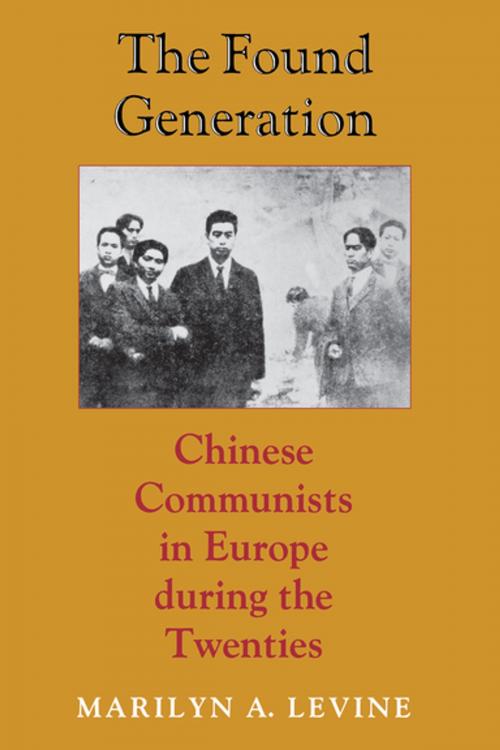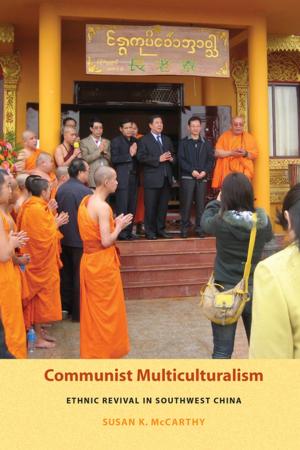The Found Generation
Chinese Communists in Europe during the Twenties
Nonfiction, Social & Cultural Studies, Social Science, Cultural Studies, Minority Studies, Anthropology| Author: | Marilyn A. Levine | ISBN: | 9780295803708 |
| Publisher: | University of Washington Press | Publication: | May 1, 2017 |
| Imprint: | University of Washington Press | Language: | English |
| Author: | Marilyn A. Levine |
| ISBN: | 9780295803708 |
| Publisher: | University of Washington Press |
| Publication: | May 1, 2017 |
| Imprint: | University of Washington Press |
| Language: | English |
In contrast to the Lost Generation of youth in the West, who were disoriented and disillusioned by the First World War and its aftermath, the Chinese youth born between 1895 and 1905 not only believed they had a duty to �save� their nation but pursued their goal through social and political experimentation. The vigorous purpose and optimism of this Found Generation contrasted with the apathy and detachment of their Western counterparts, who followed a different path in coming to terms with the new world of the twentieth century.
Just after the First World War, sixteen hundred Chinese young men and women traveled to Europe, most of them to France, as members of the Work-Study Movement. Their goal was to study Western technology and culture and utilize this knowledge to achieve �national salvation,� and they planned to finance their study at European schools by factory work. While in Europe, many of these students became politicized, partly through their exposure to European political ideas such as Marxism, and partly through the social network based on shared experience that transcended what would have separated them in China. One important result of this political activity was the formation of the European Branches of the Chinese Communist ORganizations (ECCO).
The Found Generation explores the origins, development, and significance of the ECCO, highlights the differences between it and the Communist home organization, and describes its impact on the Chinese Communist Party. The founders of the ECCO shared values and goals with their compatriots in China, but their experiences and opportunities in Europe molded them in different ways that can be traced in their later careers.
On their return to China, many of the young activists--including Zhou Enlai, Deng Xiaoping, Chen Yi, Cai Hesen, Li Lisan, Zhu De, Nie Rongzhen, and Wang Ruofei--quickly assumed powerful positions in Chinese politics, and their influence is still felt today. Levine�s examination of the early experiences of this important cohort of Chinese leaders helps explain their adherence to the Leninist concept of Party discipline and their tenacious hold over central governmental power.
The Found Generation is a pioneering study based on original sources (including interviews with several prominent participants in the Work-Study Movement and the ECCO), Chinese studies and memoirs, and Chinese and French periodicals. It provides otherwise unavailable information and analysis about the political leadership of modern China and, by pointing out the differences between the Chinese radicals in Europe in China, it furthers our understanding of the conflicts, motivations, and values of modern Chinese leaders.
In contrast to the Lost Generation of youth in the West, who were disoriented and disillusioned by the First World War and its aftermath, the Chinese youth born between 1895 and 1905 not only believed they had a duty to �save� their nation but pursued their goal through social and political experimentation. The vigorous purpose and optimism of this Found Generation contrasted with the apathy and detachment of their Western counterparts, who followed a different path in coming to terms with the new world of the twentieth century.
Just after the First World War, sixteen hundred Chinese young men and women traveled to Europe, most of them to France, as members of the Work-Study Movement. Their goal was to study Western technology and culture and utilize this knowledge to achieve �national salvation,� and they planned to finance their study at European schools by factory work. While in Europe, many of these students became politicized, partly through their exposure to European political ideas such as Marxism, and partly through the social network based on shared experience that transcended what would have separated them in China. One important result of this political activity was the formation of the European Branches of the Chinese Communist ORganizations (ECCO).
The Found Generation explores the origins, development, and significance of the ECCO, highlights the differences between it and the Communist home organization, and describes its impact on the Chinese Communist Party. The founders of the ECCO shared values and goals with their compatriots in China, but their experiences and opportunities in Europe molded them in different ways that can be traced in their later careers.
On their return to China, many of the young activists--including Zhou Enlai, Deng Xiaoping, Chen Yi, Cai Hesen, Li Lisan, Zhu De, Nie Rongzhen, and Wang Ruofei--quickly assumed powerful positions in Chinese politics, and their influence is still felt today. Levine�s examination of the early experiences of this important cohort of Chinese leaders helps explain their adherence to the Leninist concept of Party discipline and their tenacious hold over central governmental power.
The Found Generation is a pioneering study based on original sources (including interviews with several prominent participants in the Work-Study Movement and the ECCO), Chinese studies and memoirs, and Chinese and French periodicals. It provides otherwise unavailable information and analysis about the political leadership of modern China and, by pointing out the differences between the Chinese radicals in Europe in China, it furthers our understanding of the conflicts, motivations, and values of modern Chinese leaders.















